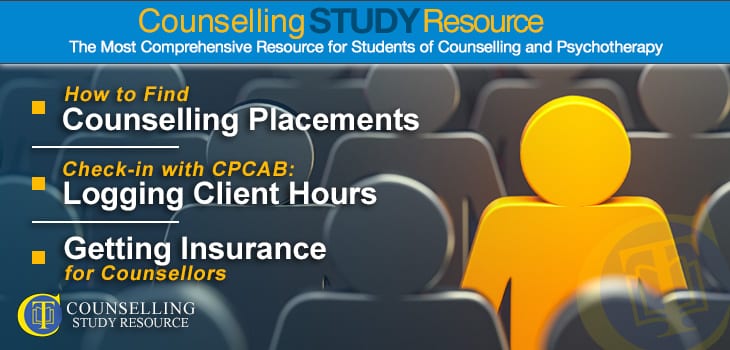128 – How to Find Counselling Placements
Logging Client Hours – Insurance for Counsellors
In episode 128 of the Counselling Tutor Podcast, Ken Kelly and Rory Lees-Oakes talk about applying for counselling placements. ‘Check-In with CPCAB’ then discusses how to log client hours, in particular looking at clients who DNA (do not attend) and at session lengths. Finally, the presenters explain the importance of having the right insurance as a counsellor.
How to Find Counselling Placements (starts at 2.05 mins)
When you are a final-stage counselling student, getting a placement is essential to completing your qualification successfully.
Rory advises that November to December is an ideal time to look for counselling placements.
This can take some time, as it involves a number of stages, including:
- looking around for suitable opportunities
- getting an interview
- having a DBS (Disclosure and Barring Service) check
- possibly doing some in-house training
- having an induction
If you do have any previous convictions that you know will show up in your DBS check, this may not stop you qualifying as a counsellor (depending on their exact nature) but it’s sensible to be honest with the agency from the start.
Your placement must be right for you – e.g. in location, opening hours and any specialisation. You might want to plan questions to ask them, if you can’t find out the answers from their website and any other information that is available to you.
For example, do they use internal or external supervision? You might also like to ask whether there is any opportunity for progression to paid work there after qualification.
Rory suggests writing a letter to any agencies you might be interested in, as this can look more impressive and capture their attention more than simply leaving a voicemail or emailing – so making you stand out from the crowd.
Here in the CSR, you can watch this lecture dedicated to how to find counselling placements.
Check-In with CPCAB: Logging Client Hours (starts at 12.45 mins)
Rory speaks to Heather Price (Senior Counselling Professional) at CPCAB (Counselling & Psychotherapy Central Awarding Body) about logging hours as a counselling student.
When you are on placement, it’s vital to record and evidence your hours properly, providing the details required on the log form and getting these signed off by your managerial supervisor in the agency.
Although it can be very frustrating when clients DNA, you really can’t count these as you are not getting practice during this time.
It is important to spend some time reflecting on any feelings that arise in you when a client DNAs: you might like to use this reflection to write in your journal or to produce a learning review.
If you do notice particularly strong feelings arising, ask yourself whether there is any transference: does the experience remind you of someone else in your life being late or not turning up for you?
It can ease the frustration to ensure that you have some work with you that you can do in any such empty slots – Rory suggests you take along a course book to read just in case.
Last, Heather explains what can be counted as an hour.
The counselling hour is typically 50 minutes – so that counsellors can have on-the-hour time slots but still process the session, write notes etc. before the next client arrives. Avoiding clients crossing over is also better for client confidentiality. You can count a session of 50 minutes as a counselling hour.
If a session lasts less than 50 minutes, you should record the actual minutes of contact time.
If a particular client regularly leaves before the end of a session planned to be 50 minutes, it is important to speak to your supervisor and perhaps also to the assessing counsellor at the agency.
Children and young people may have sessions that are planned to be shorter (e.g. 30 minutes).
In line with the guidance above, the actual minutes should be recorded on your log – in the case of 30-minute sessions, for example, you would need to have 200 sessions to complete your 100 hours’ practice.
For more information about CPCAB, please see its website. CPCAB is the UK’s only awarding body run by counsellors for counsellors.
Insurance for Counsellors (starts at 26.20 mins)
The Ethical Framework for the Counselling Professions (BACP, 2018, p.15) states:
‘We will be covered by adequate insurance when providing services directly or indirectly to the public.’
Other professional bodies in the field of counselling and psychotherapy are likely to have similar rules.
Ken and Rory offer some tips on ensuring you have the right insurance as a counsellor:
- Public liability insurance protects you if someone hurts themselves accidentally on your premises and sues you (this is therefore important for private practitioners).
- Professional indemnity insurance (to protect you as an individual professional) is important for all counsellors, both student and qualified, as soon as you are working with clients.
- Always make sure you have your own professional indemnity insurance, even if your agency also has its own organisational policy.
- As well as the insurance cover itself, insurance companies can provide valuable advice via their helpline if you find yourself in a tricky situation professionally (e.g. if a complaint is made against you or if the police ask for a client record).
- Always read the policy before you buy it, to check it’s fit for your purpose.
- Remember to update the policy if your practice changes in any way.
- If you are working from home once qualified, don’t assume that your regular household insurance will cover your practice: it probably won’t.
In short, protect yourself and protect your practice!


